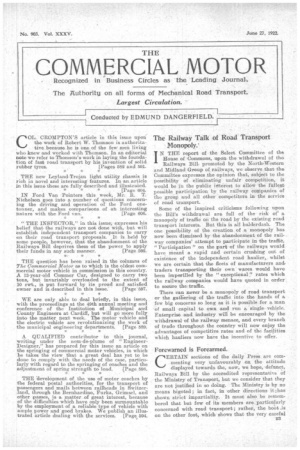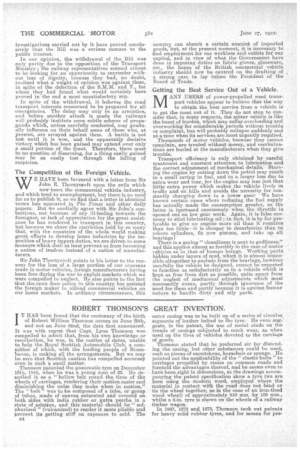The Railway Talk of Road Transport Monopoly.'
Page 1

Page 2

If you've noticed an error in this article please click here to report it so we can fix it.
IN THE report of the Select Committee of the House of Commons, upon the withdrawal of the Railways Bill promoted by the North-Western and Midland Group of railways, we observe that the Committee expresses the opinion that, subject to the possibility of eliminating unfair competition, it would be in the public irtterest to allow the fullest possible participation by the railway companies of the group and all other competitors in the service of road transport.
Some of the inspired criticisms following upon the Bill's withdrawal are full of the risk of' a monopoly of traffic on the road by the existing road transport interests. But this is all balderdash. The one possibility of the creation of a monopoly has now been dismissed by the abandonment of the railway companies' attempt to participate in the traffic. " Participation " on the part of the railways would have meant a rapid and certain crushing out of existence of the independent road haulier, whilst we are certain that the fleets of manufacturers and.. traders transporting their own wares would have been imperilled by the "exceptional ." rates which the railway companies would have quoted in order to secure the traffic.
There can never be a monopoly of road transport or the gathering of the traffic into the hands of a few big concerns so long as it is possible for a man 'of small capital to own and run a single vehicle. Enterprise and industry will be encouraged by the withdrawal of the railway menace, and every branch of trade throughout the country will now enjoy the advantages of competitive rates and of the facilities which hauliers now have the incentive to offer.
Forewarned is Forearmed.
CERTAIN sections of the daily Press are commenting very unfavourably on. the attitude displayed towards the, now, we hope, 'defunct, Railways Bill by the accredited representative of the Ministry of Transport, but we consider that they are not justified in so doing. The Ministry is by no means bigoted ; in. fact, in other directions it!has shown strict impartiality. It must also be remembered that but few of its members are particularly concerned with road transport; rather, the boot is on the other foot, which shows that the very careful
investigations carried out by it have proved conclusively that the Bill was a serious menace to the public interest. In our opinion, the withdrawal of the Bill was only partly due to the opposition of the Transport Ministry ; the railway representatives seemed aimed to be looking for an opportunity to surrender without loss of dignity, because they had, no doubt, realized what a weight of opinion was against them, in spite of the defection of the S.M.M. . and T., for whom they had found what would certainly have proved in the end a most unsatisfactory sop.
In spite of the withdrawal, it behoves the road transport interests concerned to be prepared for all emergencies. The delay may only be an armistice, and before another attack is made the railways will probablY institute some subtle• scheme of propaganda which, unless carefully combated, may gradually influence on their behalf some of those who, at present, are arrayed against them. A battle is not lost until it is won, and the apparently decisive victory which has been gained may extend over only a small portion of the front. Therefore, there must be no question of disarming, for a thing easily gained may be as easily lost through the lulling of suspicion.
The Competition of the Foreign, Vehicle,
WE HAVE been favoured with a letter from Sir John E. Thornycroft upon the evils which now beset the commercial vehicle industry, and which tend to unemployment, but there is no need for us to publish it, as we find that a letter in identical terms has appeared in The Times arid other daily papers. But we cordially agree with Sir John's contentions, not because of any ill-feeling towards the foreigner, or leek of appreciation for the great assistance he has rendered to transport in this country, but because we share the conviction held by so many that, with the countries of the whole world making great efforts to develop home industries by the imposition of heavy import duties, we are driven to some measure which shall at least prevent us from becoming a nation of traders instead of a nation of manufacturers.
Sir John Thornycroft points in his letter to the reasons for the loss of a large portion of our overseas trade in motor vehicles, foreign manufacturers having been free during the war to exploit markets which we were compelled to neglect. He also points to the fact that the open door policy in this country has assisted the foreign maker to unload commercial vehicles on our home markets. In ordinary circumstances, this country. can absorb a certain amount of imported goods, 'hut, at the present moment, it is necessary to find employment for our workless and outlets for our capital, and in view of what the Government have done in imposing duties on fabric gloves, glassware, etc., the hopes of the British commercial vehicle industry should now be centred on the drafting of a strong case to lay before the President of the Board of Trade.
Getting the Best Service Out of a Vehicle.
MANY USERS of power-propelled road transport vehicles appear to believe that the way to obtain the best service froma vehicle is to get themost out of it. They do not stop to consider that, in many respects, the motor vehicle is like the beast of burden, -which may suffer, overloading and overworking for considerable periods without trouble or complaint, but will probably collapse suddenly and at a time when its services are most urgently required. Thousands of motor vehicles, because they cannot complain. are treated without mercy, and recriminations are hurled at the manufacturers when they give trouble. Transport efficiency is only obtained by careful treatment and constant attention to lubrication and the correct adjustment of mechanical details. Starving the engine by cutting down the petrol may result in a small saving in fuel, and in a larger loss due to extra wear and tear,. for the engine may lose just that little extra power which makes the vehicle lively in traffic and on hills and avoids the necessity for constantly changing down to a lower gear We have known certain eases where reducing the fuel supply has actually made the consumption greater, as the latter is. increased enormously when the throttle is opened out on low gear work. Again, it is false economy to stint lubricating oil ; in fact, it is by far preferable to give an engine more oil than it requires than too little—it is cheaper to decarbonize than to rebore cylinders, fit new pistons, and take up all bearings I
There is a saying " cleanliness is next to godliness," and this applies almost as forcibly in the case of motor vehisles as in :that of 'human beings. Working parts hidden under layers of mud, which it is almost imposeible altogether to exclude from the bearings, however carefully the vehicle be designed, cannot be expected to function as satisfactorily as in a vehicle which is kept as free from dirt as possible, quite apart from the neglect of mechanical adjustments which must necessarily ensue, partly through ignorance of the need for them and partly because it is against human nature to handle dirty and oily parte.






























